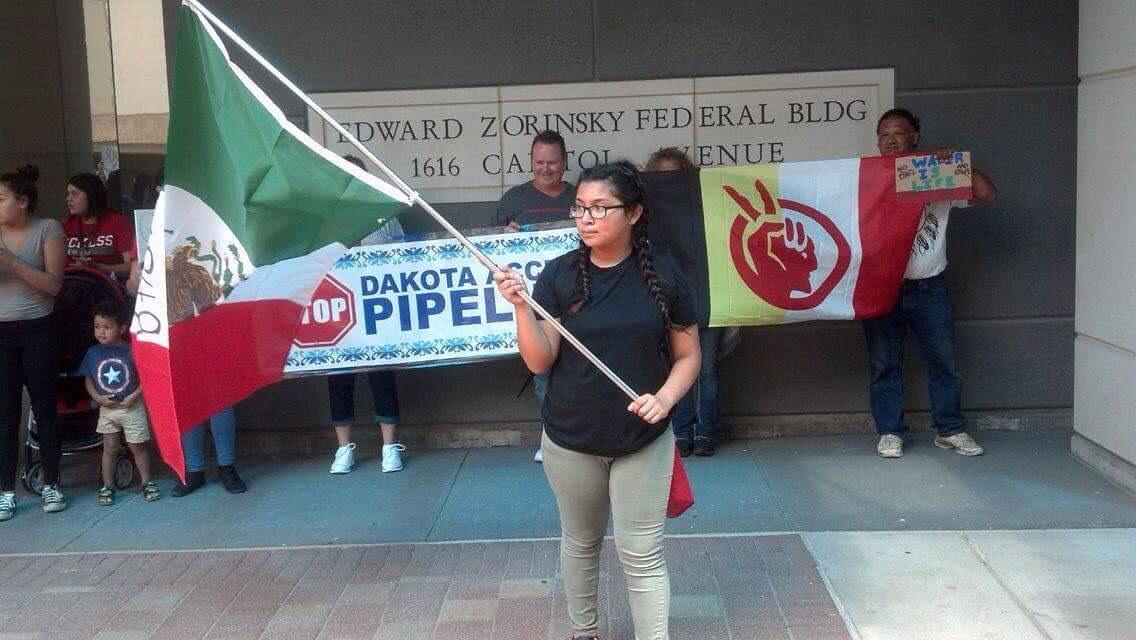Local Native Americans protest pipeline, allege water contamination
October 6, 2016
The Dakota Access Pipeline will extend from North Dakota to Illinois and carry about 470 thousand barrels of oil every day. The goal of the pipeline is to create jobs, save money on transportation of oil and to be easier on the environment. But some citizens, Native Americans in particular, oppose the pipeline.
“It [The Dakota Access Pipeline] belittles the lives of Native people who depend on the Missouri River for their water supply,” said Kateri Petto. Petto is a Native American woman who resides in Omaha, and is involved in Native American matters, such as ending the Dakota Access Pipeline and pushing to change Columbus Day to Indigenous Peoples Day.
“The original route of the Pipeline was supposed to be around Bismarck, N.D. They re-routed it because they didn’t want to potentially contaminate the water in Bismarck, which is a primarily white city,” said Petto.
Now, the pipeline goes through Standing Rock, N.D., which is a Sioux reservation. Protests have increased since then. Many Native people believe that this pipeline will contaminate the water on this reservation. But, they not only fear for Native American people, but everyone that resides in the Midwest.
“It’s not just a Native problem, it’s more of a humanity problem,” said Dakota Lieo, a Native American student studying environmental science at UNO. Because the pipeline flows through the Midwest, there is a possibility that the Missouri River could become contaminated. About 18 million people depend on the Missouri River for water, so if the pipeline were contaminated, these people would be affected, along with the people on the reservations.
However, an argument people in favor of the Dakota Access Pipeline mention is that it will bring more jobs.
“The argument that it [the construction of the pipeline] will create jobs, but those are just temporary jobs that will only be around for maybe a couple of months at most,” said Petto. “The only way it will bring about jobs is when it leaks, and we have to hire people to clean up.”
Not only do these students believe that the pipeline poses an ethical problem, they believe it poses an economical problem if it spills too. “I think it’s borderline guaranteed to eventually spill,” said Treyten Ozuna, another environmental science major at UNO. “At that point it’s not only contaminating the water it’s contaminating all of the surrounding wildlife.”
Kateri believes that the Dakota Access Pipeline is not the only time things like this have happened.
“If you look at the Navaho reservation, they’ve been without clean drinking water since the 1970s. Even in western Nebraska, they’re drilling through the Ogallala Aquifer to obtain uranium,” Kateri said.
Another issue they see with the pipeline is greed. They believe large corporations are just trying to make a profit.
“It almost feels like these big corporations are attacking Native communities, and our resources and us as a people. It’s like it doesn’t matter as long as there is profit or private gain,” says Petto.
The Dakota Access Pipeline is supposed to be in service in before the end of the year. To stop this from happening, Native American tribes and others have protested across the country. A protest in Omaha took place in September.
“This is the first time in a long time that the Native tribes have come together and stood in solidarity,” Petto said. She and other Native Americans hope that through protesting and raising awareness, they can bring about change.

